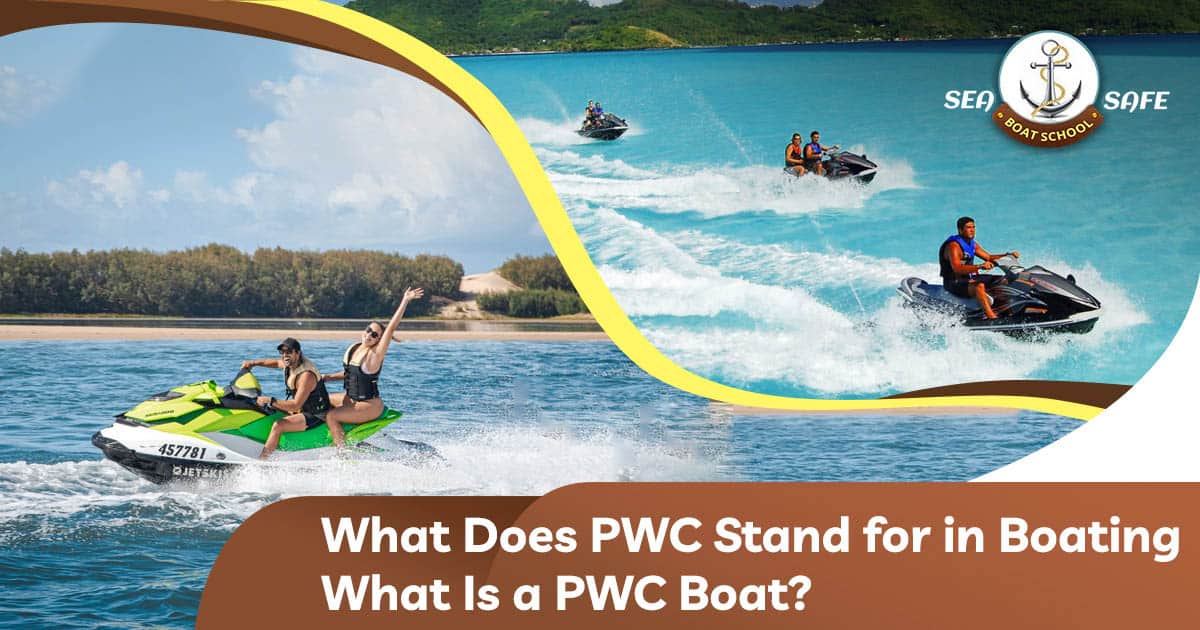Like Our Page :
Sea Safe Boat School
Arran
0429 146 201
Like Our Page :
Sea Safe Boat School
Arran
0429 146 201

If you’ve ever seen or ridden a jet ski, you’ve encountered a PWC, which stands for Personal Watercraft. These small, powerful vessels are a favourite among water sports enthusiasts for their speed and agility, and while many people wonder “what does PWC stand for in boating,” it’s simply the industry term for these exciting watercraft.
PWCs, which stands for Personal Watercrafts (a common question among boating newcomers is “What does PWC stand for in boating?”), are often used for activities like cruising around, jumping waves, or even towing water skiers. Let’s dive into what makes these watercrafts unique and what you need to know to use them safely and legally in Australia.
A PWC is a type of boat designed for individual use. Unlike larger boats where you sit inside, with a PWC, you ride on top.
They’re designed to be fast and easy to maneuver, making them perfect for zipping around on the water. PWCs are often referred to by their brand names, like “jet ski” or “WaveRunner,” but these are just different types of PWCs.
One of the cool things about PWCs is that they have a fully enclosed hull. This means that even if you tip over, the watercraft won’t fill up with water.
You can operate a PWC by sitting, standing, or kneeling, depending on the design and your comfort level. They’re versatile and can be a lot of fun, whether you’re riding solo or with a passenger.
PWCs are powered by an internal jet drive, which is different from the outboard motors you see on many other boats. This jet drive system works by sucking water into a pump and then forcing it out through a nozzle at high speed.
This thrust propels the PWC forward and allows it to make sharp turns and quick stops. It’s a unique and thrilling way to experience the water.
Operating a PWC isn’t just about having fun; it comes with responsibilities and regulations to keep everyone safe. In Australia, the rules for using a PWC can vary depending on which state you’re in.
For example, in New South Wales (NSW), you need to have a general boat licence before you can get a PWC licence. This is to ensure you know the basic rules of boating and understand the specific regulations for PWCs.
PWCs offer a fantastic way to explore the water and have a good time. They’re fast, exciting, and can provide a great workout if you’re into water sports.
However, it’s crucial to remember that with great power comes great responsibility. Always be mindful of other people on the water, whether they’re in boats, swimming, or enjoying the beach.
Follow all local laws and regulations, and never operate a PWC under the influence of alcohol or drugs. Being a responsible rider not only keeps you safe but also ensures that everyone else can enjoy the water safely.
In summary, a PWC (Personal Watercraft) is a small, maneuverable boat that’s great for water activities. They’re popular for their speed and the unique experience they offer.
However, using a PWC comes with specific rules and responsibilities, especially in Australia, where regulations can vary by state. Whether you’re a first-time rider or an experienced PWC enthusiast, consider taking the marine radio licence examination with Sea Safe Boat School Western Australia (WA) to enhance your knowledge and ensure a safe experience on the water.
By following the rules and staying informed, you can enjoy all the thrills of a personal watercraft (PWC) while ensuring a safe and enjoyable experience for everyone. If you’re looking to get started, contact us for the cheapest skippers ticket Perth and take your first step towards mastering the waves safely.

Mike Watson, chef instructor of Sea Safe Boat School, has over 35 years of sea-going experience. Starting his maritime journey at 15 in Grimsby, England, he's sailed locations like Iceland and Greenland. Certified as a Master-5 Trainer, Mike is now dedicated to offering courses to those pursuing their recreational skippers ticket in Perth.
Copyright all rights reserved © Sea Safe Boat School. Website by Selling Online Made Simple. Sitemap.